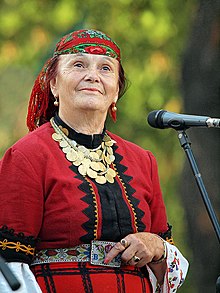Valya Balkanska
Valya Balkanska | |
|---|---|
 | |
| Background information | |
| Birth name | Valya Mladenova Balkanska |
| Born | 8 January 1942 |
| Origin | Arda, Smolyan Province, Bulgaria |
| Genres | Folk |
| Years active | 1960–present |
Valya Mladenova Balkanska (Bulgarian: Валя Младенова Балканска) (born 8 January 1942) is a Bulgarian folk music singer from the Rhodope Mountains known locally for her wide repertoire of Balkan folksong, but in the West mainly for singing the song "Izlel e Delyo Haydutin", part of the Voyager Golden Record selection of music included in the two Voyager spacecraft launched in 1977.
Born in a hamlet near the village of Arda, Smolyan Province, Balkanska has been singing Rhodopean folk songs since her early childhood. She performs a repertoire of over 300 songs in Bulgaria and abroad. Balkanska is most famous in the West for "Izlel e Delyo haydutin", which she recorded in 1968 accompanied by the bagpipe (gaida) players Lazar Kanevski and Stephan Zahmanov.
Balkanska has been working with the Rodopa State Ensemble for Folk Songs and Dances from Smolyan, of which she is a soloist, since 1960. Her album Glas ot vechnostta (Voice from the Eternity), released in 2004, is a compilation of her best-known songs, including "A bre yunache ludo i mlado", "Goro le goro zelena", and "Maychinko stara maychinko".
In 2002, Balkanska was awarded the Stara Planina Orden (the highest Bulgarian award).[1] She was honoured with her own star plate on the Bulgarian Walk of Fame in Sofia in December 2005.[2]
Izlel e Delyu Haydutin was used as the opening song for the Afghanistan documentary, Restrepo.
References
- ^ "Информационна Агенция 'Фокус'", Focus-News.net. Template:Bg icon
- ^ "ВАЛЯ БАЛКАНСКА", FamousGrouse.bg. Template:Bg icon
External links
- "Valia Balkanska - Izlel e Delio Haidutin", YouTube.com.
- "Biography of Valya Balkanska", Avtora.com. Template:Bg icon
- Village Music of Bulgaria, CD published in the Nonesuch Explorer series; Elektra Nonesuch 9 79195-2.
